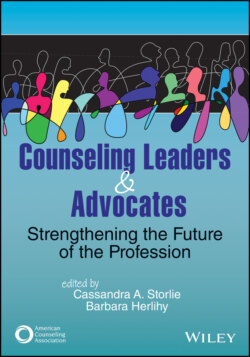Читать книгу Counseling Leaders and Advocates - Группа авторов - Страница 28
Advocacy and Social Justice in Counseling
ОглавлениеAdvocacy in counseling customarily has been connected with empowerment and action that professional counselors take on behalf of clients (Newsome & Gladding, 2014). Between the inception of the MCC and the appearance of the Multicultural and Social Justice Counseling Competencies (MSJCC), a series of ACA presidents, particularly Jane Goodman, formed initiatives to substantiate the role of advocacy in the counseling profession. These initiatives centered on explicating that advocacy has a dual purpose of client advocacy and professional advocacy (Myers & Sweeney, 2004; Myers et al., 2002). Client and professional advocacy are not competing forces; rather, they are both critical components in the preparation of effective professional counselors (Farrell & Barrio Minton, 2019; Myers et al., 2002; Storlie et al., 2019).
Goodman created a task force with the specific purpose of formulating the ACA Advocacy Competencies (Lewis et al., 2003). Endorsed by the ACA Governing Council, the ACA Advocacy Competencies introduced professional counselors to an advocacy continuum (micro- to macrolevel) that included multiple domains in which counselors could act with or act on behalf of clients, students, schools, communities, and the greater public. The ACA Advocacy Competencies have been an exemplar in the promotion of systemic change (Toporek et al., 2009), advocacy with clients and students (Ratts & Hutchins, 2009), school counseling (Haskins & Singh, 2016; Ratts et al., 2007), and community collaboration (Lopez-Baez & Paylo, 2009). It is also well understood that “many situations call for multiple forms of advocacy concurrently” (Lewis et al., 2011, p. 9).
Critical to the expansion of advocacy initiatives, social justice was prioritized and became an elucidating force, enveloping the multiple levels where systemic marginalization existed. The act of advocating became the route to social justice (Fickling & Gonzalez, 2016) because advocacy was (and is) a means of pursuing equity and justice for clients and students. As social justice began to be described as the fifth force in the counseling profession (Lee, 2012; Ratts, 2009), additional systemic and contextual factors influencing client and student wellness were recognized, especially among historically marginalized clients and students (Ratts & Greenleaf, 2018; Ratts et al., 2016). Counseling leaders engaged in political, legislative, and community advocacy and acknowledged this advocacy as a key responsibility of professional counselors. These distinct responsibilities for professional counselors are documented in the ACA Code of Ethics (ACA, 2014) with explicit language that counselors do not condone discrimination or any of its forms (Standard 5.c.). It is important to note, however, that “not condone” does not mean the same as “advocate.”
Counselors for Social Justice (CSJ) was formed in 1994 to reinforce the counseling profession’s commitment to multiculturalism and advocacy (Anderson et al., 2015). In particular, CSJ’s early developmental stages signified a movement to work in tandem with AMCD, the Association for Specialists in Group Work (ASGW), and the National Career Development Association (NCDA) to remove social conditions and barriers affecting clients’ and students’ life span development for optimal wellness. Professional associations, such as AMCD and CSJ, upheld overarching values attached to the distinct movements of multiculturalism and social justice. The scope of their organizations and their ensuing accomplishments serve as a call to action for all professional counselors to embody these values, roles, and functions as a lifelong career commitment (Ratts et al., 2016). As leaders and advocates fully immerse in the histories of professional associations, governance, and leadership, it is critical to remember that culturally responsive counseling leadership is not a one-time incident, a response to a crisis or urgent gap, or the sole responsibility of a single group. The development of cultural awareness and responsiveness is an ongoing process over a career and should be a priority for every counseling leader, advocate, and professional.
